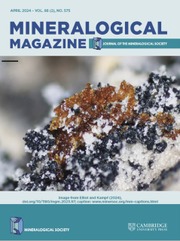Article contents
The application of scanning electron beam anomalous transmission patterns in mineralogy
Published online by Cambridge University Press: 05 July 2018
Summary
It is possible with a standard Geoscan microanalyser to produce back-scattered electron pictures that resemble Kikuchi patterns but which are produced by a different mechanism. These effects have been called scanning electron beam anomalous transmission (SEBAT) patterns and they are produced by the interaction of a parallel scanning beam of high-energy electrons with a crystalline sample. The patterns are excellent indicators of the crystallographic perfection and orientation of samples and can provide information about the lattice dimensions of solid, bulk specimens. The same specimens can, if necessary, be chemically analysed in the same instrument.
In order to produce the patterns the electron beam must be deflected through a minimum angle of approximately 20° and, on existing instruments, the beam covers an area of about 2 × 2 mm during such a deflection. Minor modification of the authors' microanalyser has reduced the scanned area to 0·5 × 0·5 mm and attempts are being made to reduce this even further.
In favourable circumstances the technique enables the mineralogist to determine, rapidly and easily, the crystallographic structure and orientation of large, bulk specimens. Examples are given of patterns that have been produced from cleaved, as grown, and polished mineral faces. The degree and nature of the crystallographic damage produced during mechanical polishing of a galena crystal are illustrated.
Information
- Type
- Research Article
- Information
- Copyright
- Copyright © The Mineralogical Society of Great Britain and Ireland 1969
References
- 3
- Cited by

